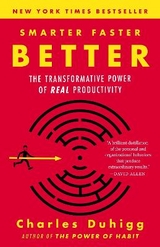
Smarter Faster Better
Random House USA Inc (Verlag)
978-0-8129-8983-0 (ISBN)
- Titel erscheint in neuer Auflage
- Artikel merken
NEW YORK TIMES BESTSELLER - From the author of The Power of Habit comes a fascinating book that explores the science of productivity, and why managing how you think is more important than what you think-with an appendix of real-world lessons to apply to your life.
At the core of Smarter Faster Better are eight key productivity concepts-from motivation and goal setting to focus and decision making-that explain why some people and companies get so much done. Drawing on the latest findings in neuroscience, psychology, and behavioral economics-as well as the experiences of CEOs, educational reformers, four-star generals, FBI agents, airplane pilots, and Broadway songwriters-this painstakingly researched book explains that the most productive people, companies, and organizations don't merely act differently.
They view the world, and their choices, in profoundly different ways.
A young woman drops out of a PhD program and starts playing poker. By training herself to envision contradictory futures, she learns to anticipate her opponents' missteps-and becomes one of the most successful players in the world.
A group of data scientists at Google embark on a four-year study of how the best teams function, and find that how a group interacts is more important than who is in the group-a principle, it turns out, that also helps explain why Saturday Night Live became a hit.
A Marine Corps general, faced with low morale among recruits, reimagines boot camp-and discovers that instilling a "bias toward action" can turn even the most directionless teenagers into self-motivating achievers.
The filmmakers behind Disney's Frozen are nearly out of time and on the brink of catastrophe-until they shake up their team in just the right way, spurring a creative breakthrough that leads to one of the highest-grossing movies of all time.
What do these people have in common?
They know that productivity relies on making certain choices. The way we frame our daily decisions; the big ambitions we embrace and the easy goals we ignore; the cultures we establish as leaders to drive innovation; the way we interact with data: These are the things that separate the merely busy from the genuinely productive.
In The Power of Habit, Pulitzer Prize-winning journalist Charles Duhigg explained why we do what we do. In Smarter Faster Better, he applies the same relentless curiosity, deep reporting, and rich storytelling to explain how we can improve at the things we do. It's a groundbreaking exploration of the science of productivity, one that can help anyone learn to succeed with less stress and struggle, and to get more done without sacrificing what we care about most-to become smarter, faster, and better at everything we do.
Charles Duhigg is a Pulitzer Prize-winning investigative reporter for The New York Times and the author of The Power of Habit and Smarter Faster Better. He is a winner of the National Academies of Sciences, National Journalism, and George Polk awards. A graduate of Harvard Business School and Yale College, he lives in Brooklyn with his wife and two children.
1 Motivation Reimagining Boot Camp, Nursing Home Rebellions, and the Locus of Control The trip was intended as a celebration, a twenty-nine-day tour of South America that would take Robert, who had just turned sixty, and his wife, Viola, first to Brazil, then over the Andes into Bolivia and Peru. Their itinerary included tours of Incan ruins, a boat trip on Lake Titicaca, the occasional craft market, and a bit of birding. That much relaxation, Robert had joked with friends before leaving, seemed unsafe. He was already anticipating the fortune he would spend on calls to his secretary. Over the previous half century Robert Philippe had built a small gas station into an auto parts empire in rural Louisiana and had made himself into a Bayou mogul through hard work, charisma, and hustle. In addition to the auto-parts business, he also owned a chemical company, a paper supplier, various swaths of land, and a real estate firm. And now here he was, entering his seventh decade, and his wife had convinced him to spend a month in a bunch of countries where, he suspected, it would be awfully difficult to find a TV showing the LSU-Ole Miss game. Robert liked to say there wasn't a dirt road or back alley along the Gulf Coast he hadn't driven at least once to drum up business. As Philippe Incorporated had grown, Robert had become famous for dragging big-city businessmen from New Orleans and Atlanta out to ramshackle bars and forbidding them from leaving until the ribs were picked clean and bottles sucked dry. Then, while everyone nursed painful hangovers the next morning, Robert would convince them to sign deals worth millions. Bartenders always knew to fill his glass with club soda while serving the bigwigs cocktails. Robert hadn't touched booze in years. He was a member of the Knights of Columbus and the chamber of commerce, past president of the Louisiana Association of Wholesalers and the Greater Baton Rouge Port Commission, the chairman of his local bank, and a loyal donor to whichever political party was more inclined to endorse his business permits that day. "You never met a man who loved working so much," his daughter, Roxann, told me. Robert and Viola had been looking forward to this South American trip. But when they stepped off the plane in La Paz, midway through the monthlong tour, Robert started acting oddly. He staggered through the airport and had to sit down to catch his breath at the baggage claim. When a group of children approached him to ask for coins, Robert threw change at their feet and laughed. In the bus to the hotel, Robert started a loud, rambling monologue about various countries he had visited and the relative attractiveness of the women who lived there. Maybe it was the altitude. At twelve thousand feet, La Paz is one of the highest cities in the world. Once they were unpacked, Viola urged Robert to nap. He wasn't interested, he said. He wanted to go out. For the next hour, he marched through town buying trinkets and exploding in a rage whenever locals didn't understand English. He eventually agreed to return to the hotel and fell asleep, but woke repeatedly during the night to vomit. The next morning, he said he felt faint but became angry when Viola suggested he rest. He spent the third day in bed. On day four, Viola decided enough was enough and cut the vacation short. Back home in Louisiana, Robert seemed to improve. His disorientation faded and he stopped saying strange things. His wife and children, however, were still worried. Robert was lethargic and refused to leave the house unless prodded. Viola had expected him to rush into the office upon their return, but after four days he hadn't so much as checked in with his secretary. When Viola reminded him that deer hunting season was approaching and he'd need to get a license, Robert said he thought he'd skip it this year. She phoned a doctor. Soon, they were driving to the Ochsner Clinic in New
| Erscheinungsdatum | 18.03.2016 |
|---|---|
| Zusatzinfo | LINE DRAWINGS THROUGHOUT |
| Verlagsort | New York |
| Sprache | englisch |
| Maße | 155 x 236 mm |
| Gewicht | 517 g |
| Themenwelt | Sachbuch/Ratgeber ► Beruf / Finanzen / Recht / Wirtschaft ► Bewerbung / Karriere |
| Sachbuch/Ratgeber ► Beruf / Finanzen / Recht / Wirtschaft ► Wirtschaft | |
| Sachbuch/Ratgeber ► Gesundheit / Leben / Psychologie ► Lebenshilfe / Lebensführung | |
| Geisteswissenschaften ► Psychologie ► Arbeits- und Organisationspsychologie | |
| Geisteswissenschaften ► Psychologie ► Sozialpsychologie | |
| Medizin / Pharmazie ► Medizinische Fachgebiete ► Psychiatrie / Psychotherapie | |
| Wirtschaft ► Betriebswirtschaft / Management ► Planung / Organisation | |
| Schlagworte | Erfolg (Wirtschaft); Ratgeber • Produktivität; Ratgeber |
| ISBN-10 | 0-8129-8983-X / 081298983X |
| ISBN-13 | 978-0-8129-8983-0 / 9780812989830 |
| Zustand | Neuware |
| Haben Sie eine Frage zum Produkt? |
aus dem Bereich



